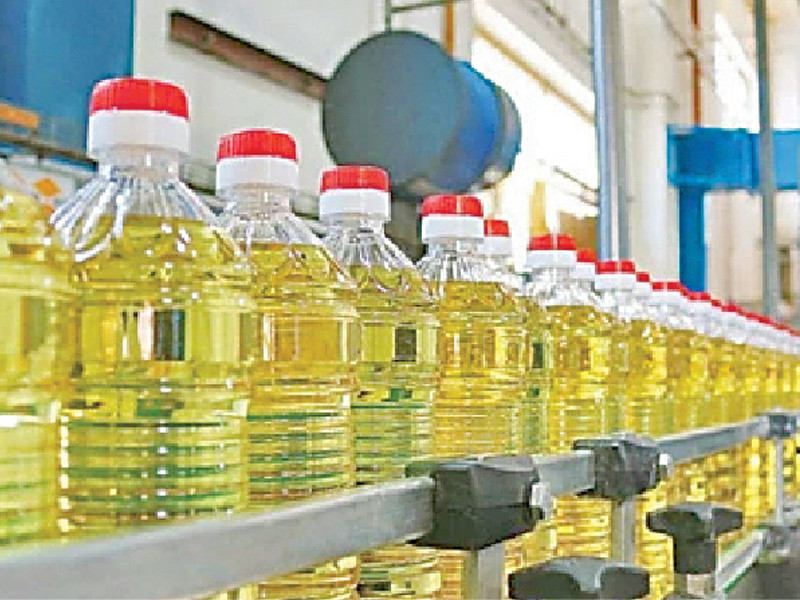The government should contemplate imposing a 20-22% sales tax and a 5% income tax on commercial importers to discourage them, said KK Group of Industries CEO Khalid Islam Sheikh. Photo: file
KARACHI:
Edible oil manufacturers have called for reducing the duty on Crude Palm Oil (CPO), abolishing section 8B of the Sales Tax Act, and enhancing taxes on commercial importers. The aim is to encourage farmers and others to boost industrial growth in the country.
They reported that over 3.2 million metric tonnes of palm oil are imported into the country. The edible oil sector sources raw materials from domestic and global sources, manufacturing 4.5 million metric tonnes of standardised and high-quality Banaspati and cooking oil to meet the national demand.
While speaking to The Express Tribune, they noted that the edible oil sector’s annual turnover exceeds Rs2,400 billion per annum. Manufacturers contribute up to Rs550 billion directly or indirectly to the national exchequer in terms of duties, taxes, and other levies. This sector ranks among the top five revenue spinners of the country, as announced by the Federal Board of Revenue (FBR) and the Ministry of Finance. The oil palm industry is a pillar of the country’s economy and plays a key role in meeting the ever-growing national demand.
Federation of Pakistan Chambers of Commerce and Industry (FPCCI) President and former chairman of the Pakistan Vanaspati Manufacturers Association (PVMA), Atif Ikram Sheikh stressed the need for more economic and political stability in the country to promote industrialisation and bolster the national economy, benefiting all industrialists and the business community.
Discussing numerous issues in the edible oil industry, he reiterated his previous statement that section 8B of the Sales Tax Act 1990 should be abolished. He pointed out that the 10% differential, disfavouring and discouraging industrialists compared to commercial importers, should be eliminated, as it disrupts cash flow.
He further suggested that higher tariffs should be imposed on commercial importers than on industries to facilitate local industries. There should be a significant difference in tariffs between manufacturers and commercial importers, with manufacturers receiving lower rates.
Finally, he called for reducing duty on Crude Palm Oil (CPO) since many refineries are closed due to the high duty on crude palm oil. He noted that in the past, there was less duty on the import of crude palm oil, resulting in better industrial growth.
Read
Increase local production of edible oil: expertsSpeaking about oil palm plantations in the country, he mentioned that both the local industry and the government are working on it. Previous attempts were made, and oil palm fruits also grew, but proper yield was not achieved due to certain weather conditions such as excessive rains.
He mentioned that the stakeholders have resumed their efforts, expressing hope that fresh fruit would yield abundant harvests in regions like Thatta and Sujawal, where weather conditions favour fruit cultivation.
“The government is currently unable to offer direct assistance to the industry. However, it should consider increasing taxes on commercial importers to create more room for the local industry to grow and thrive. Currently, the industry pays an 18% sales tax and 2% income tax, while commercial importers pay the same sales tax and 3% income tax. The government should contemplate imposing a 20% to 22% sales tax and a 5% income tax on commercial importers, thereby discouraging them,” remarked KK Group of Industries CEO Khalid Islam Sheikh.
He stressed that if the government formulates favourable and supportive policies, it would incentivise farmers to cultivate more sunflower, canola, and soybean instead of concentrating solely on wheat.
“Approximately 1.5 to 1.6 million metric tonnes of canola, sunflower, and soybean seeds are imported for oil extraction purposes. By increasing import duties on these seeds, the government can encourage growers to cultivate more of these crops for subsequent harvests and also supply seeds to the industry. Consequently, this policy would reduce the import bill for seeds,” he added.
Wrapping up his remarks, he noted, “During a two-month season, we solely rely on domestic cottonseed oil to meet a local demand of 200,000 to 250,000 metric tonnes. However, this oil is predominantly consumed by other industries.”
Published in The Express Tribune, February 13th, 2024.
Like Business on Facebook, follow @TribuneBiz on Twitter to stay informed and join in the conversation.


